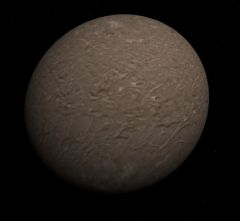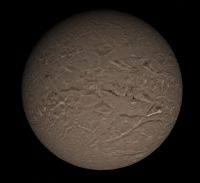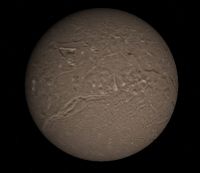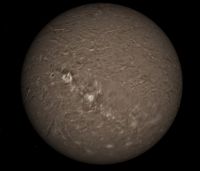Difference between revisions of "Ariel"
(Added image.) |
(Added category.) |
||
| Line 73: | Line 73: | ||
[[Category: Articles]] | [[Category: Articles]] | ||
[[Category:Celestial bodies]] | [[Category:Celestial bodies]] | ||
| + | [[Category:Solar System]] | ||
[[Category:Natural satellites]] | [[Category:Natural satellites]] | ||
[[Category:Satellites of Uranus]] | [[Category:Satellites of Uranus]] | ||
Revision as of 03:19, 12 September 2024
Ariel is the fourth-largest moon of Uranus, orbiting in the planet's equatorial plane. It is the second of the major satellites of Uranus.
Ariel was discovered by William Lassell on 24 October 1851.
Ariel in Orbiter
Ariel was introduced to Orbiter with the release of uranus-neptune-moons.zip in October 2002.
| Add-on | Source | Version | Author | Type | Release Date | Compatibility | Wiki article |
|---|---|---|---|---|---|---|---|
| Orbiter 2003-P2 | O-F Resources | 031217 | martins | Orbiter Download | 17 December 2003 | Orbiter 2003-P2 | |
| Orbiter 2003-P1 | O-F Resources | 031105 | martins | Orbiter Download | 5 November 2003 | Orbiter 2003-P1 | |
| Uranus / Neptune Moons Addon | AVSIM | Robert Stettner (Foxtrot) | Scenery | 12 October 2002 | |||
See also
- Ariel as seen by the Voyager 2 spacecraft in 1986
from Wikimedia Commons
| Uranus's natural satellites |
|---|
| Named Satellites:
Ariel | Belinda | Bianca | Caliban | Cordelia | Cressida | Cupid | Desdemona | Ferdinand | Francisco | Juliet | Mab | Margaret | Miranda | Oberon | Ophelia | Perdita | Portia | Prospero | Puck | Rosalind | Setebos | Stephano | Sycorax | Titania | Trinculo | Umbriel Numbered Satellites: |
| See also: Pronunciation key | rings of Uranus |
| edit The Solar System | |
|---|---|
| Central star |
Sun (Sol) |
| Planets |
Mercury - Venus - Earth - Mars - Jupiter - Saturn - Uranus - Neptune |
| Natural satellites |
Moon - Phobos - Deimos - Io - Europa - Ganymede - Titan - more... |
| Add-ons |
Planets - Dwarf Planets - Small objects - Natural satellites - Alternative star systems |
 | This natural satellite related article is a stub. You can help Orbiterwiki by expanding it. |




